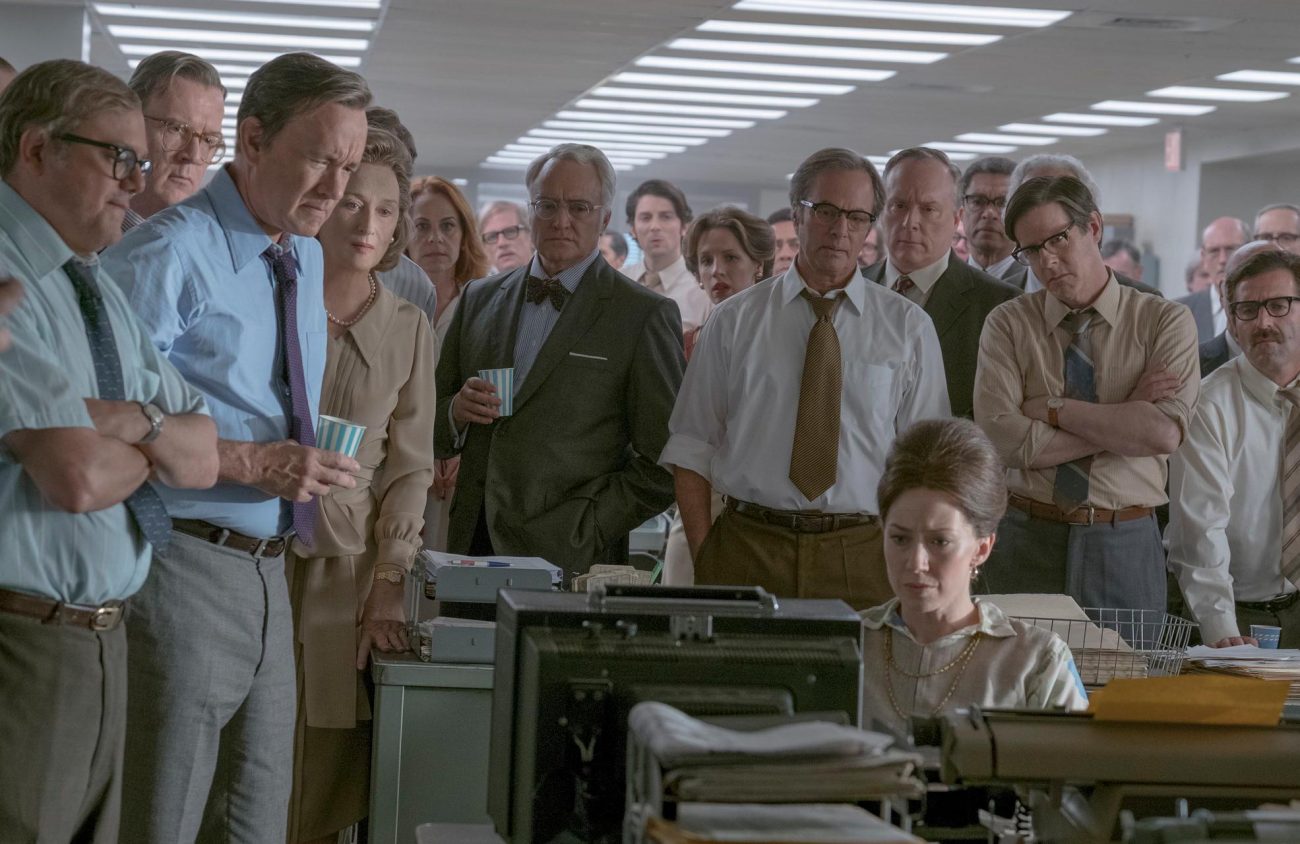No question Steven Spielberg is a great director.
Several times during The Post, Spielberg’s new movie about The Washington Post’s decision in 1971 to publish the classified Pentagon Papers after Nixon forced The New York Times to cease and desist, I found tears welling in my eyes — usually as a sentimental response to some heroic gesture or other by a journalist toward the freedoms guaranteed by our Constitution, up against the threat of imprisonment.
Spielberg has always had a talent for visions of triumphant patriotism that cut, like a hot knife through butter, through the partisan lines that make a bloody battleground of contested history. Witness the bookends to Saving Private Ryan — the opening and closing scenes of Matt Damon as an aged Pvt. Ryan visiting the Normandy cemetery.
For their overweening and hyperbolic symbolism, these scenes — full of snapping American flags and heart-wrenching tears of sacrifice — rival anything Leni Riefenstahl did in service to the Third Reich. They overwhelm all subtlety with emotional erasure.
Had Spielberg lopped off these sentiment-jerking scenes, leaving them on the cutting-room floor, Saving Private Ryan would have been an uncontestable masterpiece, easily the finest World War II film ever made. As it is, it’s just another really good Spielberg film.
The Post is also another really good Spielberg film, and its pleasures are numerable, its problems insidious and nagging. Like Frank Capra before him, Spielberg is a master of narrative thrust, and he imbues the story of how the Post was given classified documents revealing the lie of the Vietnam War, and then published those findings, with all the propulsive gusto of a Hitchcock thriller. He has an absolute genius for keeping our attention. The rhythms and cadences of his films are unimpeachable.
The greatest thrill of The Post is watching Tom Hanks and Meryl Streep tangle it up on screen as Ben Bradlee and Kay Graham, the Post’s real-life editor and publisher at the time. As the plot boils around them, full of the sound and fury of real history, Hanks and Streep create an alternate current, a chamber drama in miniature in which the film’s larger themes are treated as intimate human drama. Watching them operate brings to mind Grant and Hepburn on screen, and it’s a thing to savor.
It’s also fun to watch an (albeit highly idealized) portrayal of how newspapers used to, and should still, work: As a gutsy, uncomplicated check on the infinitely corruptible powers of government, staffed by fierce and crusty bulldog reporters who answer to an editor undeterred by the consequences of publishing truth and facts, and overseen by a publisher who serves the republic first, investors second.
The Post paints this portrait in sweeping terms of black and white, good guys and bad guys, which is another kind of erasure that Spielberg routinely works on history: The story he tells is so flattering to our inherent pieties about right and wrong that it’s impossible not to get swept up in his simplified vision — a utopian vision of America that is blithely unconcerned with long-range issues of cause and effect, and that frames important moments with little regard for geopolitical intricacies, historical precursors, the dictates of aggressive imperialism or the mixed motives of complicated human actors.
Spielberg, I suspect, possesses a deep distrust of human beings, a lack of trust that seems to extend to his audience. He makes kids movies for adults, always driven by a sinking suspicion that we’re not going to get it unless he paints reality in the broadest of strokes, defined by the broadest of gestures, and sprinkled with galumphing truisms that are irresistible. But irresistible is not irrefutable.
Obviously, the timing of The Post is significant, mired as we are in a social and political and constitutional crisis that makes Nixon’s villainy look like a pillow fight. In repackaging that historical moment for us as a swashbuckling drama, he pulls an amazing sleight-of-hand: He conflates the expression of freedom with freedom itself, turning opposition into an opportunity for self-improvement — a feeling rather than a fact, an end in itself rather than the beginning of the fight. (Cinemark 17, Valley River Cinemas)
